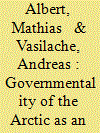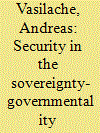|
|
|
Sort Order |
|
|
|
Items / Page
|
|
|
|
|
|
|
| Srl | Item |
| 1 |
ID:
157795


|
|
|
|
|
| Summary/Abstract |
Linked to the image of a wild and still-to-be-explored territory, as well as to images of the region as one of new economic opportunities, discourses on the Arctic also tie in with issues of climate change, cooperation and conflict, Arctic governance, international law and the situation and rights of indigenous people, as well as Great Power politics. Taken together, these aspects characterize a region whose formation is different from regionalization processes in other parts of the world. As the regional peculiarity of the Arctic is reflected by a variety and plurality of representations, discourses, perceptions and imaginaries, it can usefully be analyzed as a region of unfolding governmentality. The present article argues that the prospects for the Arctic are strongly intertwined with perceptions and depictions of it as an international region subject to emerging practices of governmentality. By drawing on both Foucault’s texts and governmentality studies in international relations (IR), we discuss how the Arctic is affected by governmental security rationalities, by specific logics of political economy and order-building, as well as becoming a subject for biopolitical rationalizations and imaginaries. The discourses and practices of governmentality that permeate the Arctic contribute to its spatial, figurative and political reframing and are aimed at making it a governable region that can be addressed by, and accessible for, ordering rationalities and measures.
|
|
|
|
|
|
|
|
|
|
|
|
|
|
|
|
| 2 |
ID:
136105


|
|
|
|
|
| Summary/Abstract |
In January 2012, the US administration released new strategic guidance for the Department of Defense entitled ‘Sustaining US Global Leadership: Priorities for 21st Century Defense’. Two different security approaches seem to coincide in this document. By providing a governmental reading of the new strategic guidance, the aim of this article is to discuss if and how the guidance links a sovereign security understanding of great power politics on one side to governmental rationalities on the other. First, the guidance is discussed with regard to its main aims and strategies; then, second, the impact of governmentality in the guidance is revealed and systematized. Finally, the function that governmental logics have in the document, and the conceptual and political role that the minimally mediated encounter of sovereign (military) power politics with governmental rationalities plays, are considered.
|
|
|
|
|
|
|
|
|
|
|
|
|
|
|
|
| 3 |
ID:
170606


|
|
|
|
|
| Summary/Abstract |
There is broad interest in both analytics and politics of governmentality in international security studies. Going beyond sovereignty-focussed perspectives, governmentality approaches contribute to a better understanding of security rationalities, strategies, and practices as well as provide important new insights into trans-border security issues. However, because the rejection of traditional, sovereign understandings of security is a constitutive trait of governmentality, governmentality-focussed approaches in general ignore the security logics and practices in non-liberal settings as well as the persistence of sovereign security patterns besides and within governmental security rationalities. Such blind spots are even more problematic in light of universalist analytical tendencies in governmentality IR. This paper aims at highlighting these blind spots of governmental security studies and argues for a more inclusive perspective that takes into account the ongoing relevance of sovereign security logics and practices. As a result, I suggest a linear conceptual model of a sovereignty-governmentality continuum that is able to grasp the complex and adjustable configurations of sovereign and governmental politics in empirical research, while sovereign and governmental patterns still remain distinguishable.
|
|
|
|
|
|
|
|
|
|
|
|
|
|
|
|
|
|
|
|
|